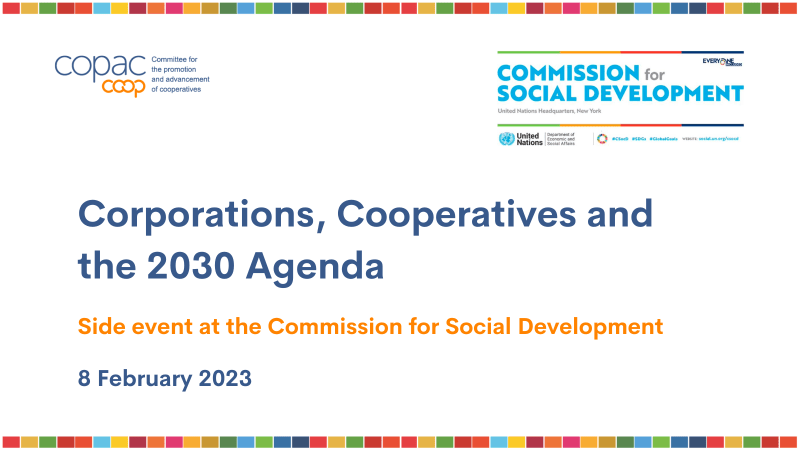
On the 8 February 2023, the International Cooperative Alliance participated at the side event themed “Corporations, Cooperatives and the 2030 Agenda” that was organized by the United Nations Department of Economic and Social Affairs (UN DESA) in collaboration with the Permanent Mission of Mongolia to the United Nation and the Committee for the Promotion and Advancement of Cooperatives (COPAC). The side event was organized at the UN Headquarters in New York during the 61st Session of the Commission for Social Development whose priority theme is “Creating full and productive employment and decent work for all as a way of overcoming inequalities to accelerate the recovery from the COVID-19 pandemic and the full implementation of the 2030 Agenda for Sustainable Development”.
Ms. Daniela Bas, UN DESA Director, opened the event by highlighting the important role of partnerships between cooperatives and corporations in promoting employment and reducing inequalities. “This partnership can leverage the strength and expertise of both sectors to sustainable employment and improving life standards for communities” she added. Ms. Bas proposed ways in which cooperatives and corporations can partner, such as collaborative procurement, joint ventures, capacity building and social and environmental sustainability. She shared a few examples of successful cases of such partnerships, including the community trade programme of the cosmetic group The Body Shop, the Grameen Bank from Bangladesh, or the partnership between Ben & Jerry’s and Fair Trade.
Ambassador H.E. Mr. Enkhbold Vorshilov, Permanent Representative of Mongolia to the United Nations, stressed the need “to build up multi-stakeholders to build prosperity” in the context of multiple crisis and the importance of involving cooperatives for a transformative recovery from the COVID-19 pandemic. Mr. Vorshilov also pointed out that “as main sponsor of the UN General Assembly resolution on “Cooperatives in social development”, Mongolia strives to encourage governments to create policies and programmes that promote the cooperative enterprise model”. Further elaborating on this, he gave the example of his country, Mongolia, which has seen a rise in the number of cooperatives following the recently amended law on cooperatives. He noted that Mongolian cooperatives mostly operate in rural areas and make significant contribution to the local development.
Ms. Florence Bore, Cabinet Secretary of the Ministry of Labour and Social Protection of Kenya, called for “initiatives that encourages a bottom-up economy that empowers citizens by enabling them to participate and benefit from the gross of their economy. Such initiatives could include incentives for cooperatives to implement enterprise development plans to create sustainable jobs, increase access to financial services and open new markets.” She also highlighted that the Government of Kenya recognizes the value of cooperatives and creates measure to support their growth and development, noting that the number of cooperatives has grown by 30% from 2017 to 2021.
In the panel discussion, Mr Bruno Roelants, the ICA Director General and Chair of COPAC, said that cooperatives are like barometers of common people’s needs and evolve with them. He added that one of the most prominent social needs is inequality and cooperatives have a proven track record in reducing inequalities in the communities where they are based. Linking with the theme of the session, Mr. Roelants affirmed that cooperatives develop a strong culture of partnership that goes beyond the cooperative movement and that has encouraged the strong interpenetration between cooperatives and corporations that already exists in many sectors and countries.
The representatives of the Brazilian credit cooperative CRESOL and the international company CSM Ingredients also emphasized the added value for corporations and the local community of partnering with cooperatives. In this regard, Mr Aldo Uva, CEO of CSM Ingredients, noted that sectors in which farmers are not organised as cooperatives are the poorest in the ecosystem, as much of the wealth goes to the intermediary.
In conclusion, Mr. Angus Rennie, the UN Liaison to the Global Compact said that “there is opportunity to shine a light on the leadership role that cooperatives play in advancing responsible business practices and the values that UN is encouraging.”
The side-event is expected to launch a series of events throughout the year that will seek to promote multi-stakeholder collaboration for Sustainable Development under the auspices of UN DESA.
You can watch the side event here.




